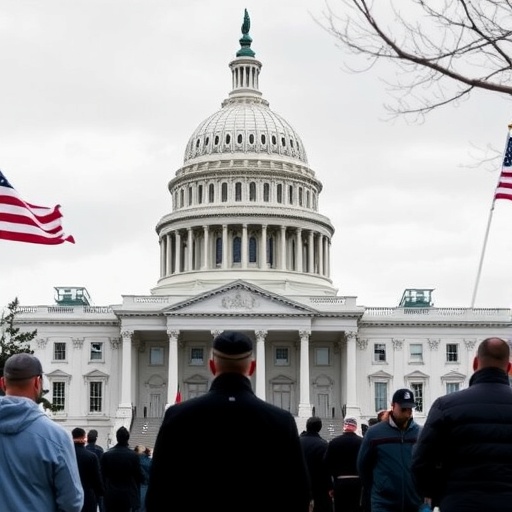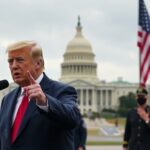US Government shutdown Escalates Fears of Trump’s Executive Power Grab Over Congressional Federal Spending Authority
In a dramatic standoff that’s paralyzing the nation’s capital, the ongoing Government shutdown has plunged the United States into uncertainty, with President Trump accused of wielding unprecedented executive power to bypass Congress‘s sacred role in controlling federal spending. As federal agencies grind to a halt and billions in taxpayer dollars remain frozen, critics warn that this crisis isn’t just about a border wall—it’s a direct assault on the constitutional balance of powers, potentially reshaping how America funds its government for generations.
Shutdown Paralysis Hits Essential Services Nationwide
The Government shutdown, now stretching into its third week, has left over 800,000 federal workers without paychecks, forcing many to rely on food banks and credit cards to make ends meet. From air traffic controllers working without compensation at major airports to national park rangers patrolling Yosemite amid dwindling supplies, the human cost is mounting rapidly. According to the Office of Personnel Management, non-essential services across 24 federal departments are suspended, affecting everything from passport processing to FDA food inspections.
Statistics paint a grim picture: The shutdown is the longest in U.S. history, surpassing the 21-day record set in 1995-1996 under President Clinton. Economists at the Brookings Institution estimate daily losses exceeding $1.5 billion, with ripple effects hitting small businesses dependent on federal contracts. “This isn’t just red tape—it’s real lives disrupted,” said Sen. Chuck Schumer (D-NY) in a floor speech last week, highlighting how Coast Guard families are skipping meals while their spouses serve unpaid.
Historical context underscores the severity. Past shutdowns, like the 16-day impasse in 2013 over the Affordable Care Act, caused temporary chaos but resolved without lasting damage. This time, however, the impasse centers on Trump‘s demand for $5.7 billion in wall funding, which Congress has repeatedly rejected in bipartisan votes. The result? A frozen federal budget process that’s left critical infrastructure projects, such as veterans’ healthcare expansions, in limbo.
Trump’s Unilateral Actions Redefine Executive Boundaries
At the heart of the controversy is President Trump‘s aggressive expansion of executive power, drawing sharp rebukes from constitutional scholars. In a move that stunned Washington, Trump recently declared a national emergency to redirect military construction funds toward the border wall, effectively sidestepping Congress‘s appropriations authority under Article I of the Constitution. This executive order, signed amid the government shutdown, aims to unlock up to $8 billion from Pentagon budgets, including funds earmarked for schools on military bases and disaster relief in hurricane-ravaged areas.
“The President is treating the federal spending process like a personal ATM,” warned Elizabeth Goitein, co-director of the Brennan Center for Justice’s Liberty & National Security Program. In an op-ed for The New York Times, Goitein argued that such actions erode the checks and balances envisioned by the Founding Fathers, potentially setting a precedent for future presidents to fund pet projects without legislative buy-in.
Legal challenges are already piling up. The American Civil Liberties Union (ACLU) filed a lawsuit on behalf of affected communities, claiming the emergency declaration is a sham. “Congress holds the purse strings for a reason—to prevent executive overreach,” ACLU attorney Lee Gelernt stated in court filings. Meanwhile, House Democrats, now in the majority, passed a resolution condemning the move, vowing to use their subpoena power to investigate the administration’s financial maneuvers.
Defenders of Trump, including White House Press Secretary Sarah Sanders, counter that the shutdown itself is Congress‘s fault for refusing to negotiate. “The President is using every tool at his disposal to secure the border, as the American people demanded,” Sanders said during a briefing. Yet, even some Republicans, like Sen. Lindsey Graham (R-SC), have expressed unease, calling for a compromise to restore normalcy before the crisis deepens.
Congressional Gridlock Exposes Deep Partisan Rifts
Congress‘s inability to break the deadlock reveals fractures that have widened under Trump‘s tenure. The Senate, controlled by Republicans, has blocked multiple funding bills passed by the Democrat-led House, which included disaster aid for wildfires and floods but omitted wall money. Speaker Nancy Pelosi (D-CA) has stood firm, tweeting, “We can’t reward bad faith with billions—national security starts with securing our democracy.”
Behind the scenes, negotiations have faltered over ideological lines. A leaked memo from House Republicans shows internal divisions, with moderates pushing for a clean continuing resolution to end the government shutdown, while hardliners align with Trump‘s base. Polling from Quinnipiac University indicates 54% of Americans blame Trump for the impasse, up from 45% a week ago, with approval ratings for Congress hovering at a dismal 18%.
The broader implications for federal spending are profound. The Budget Control Act of 2011, which caps discretionary spending, is set to expire soon, and the shutdown delays key debates on defense, education, and healthcare allocations. Experts like Maya MacGuineas, president of the Committee for a Responsible Federal Budget, warn that prolonged uncertainty could balloon the national debt, already at $21.7 trillion, by complicating long-term fiscal planning.
- Key Impacts on Federal Agencies: IRS tax refunds delayed, affecting 10 million households.
- Economic Strain: Small businesses lose $3 billion weekly in federal payments.
- Public Health Risks: CDC flu monitoring curtailed during peak season.
International allies are watching closely, with European leaders expressing concern over U.S. instability. “A shutdown of this magnitude undermines global confidence in American governance,” noted a spokesperson for the European Union.
Economic Fallout Threatens Holiday Season and Beyond
As the government shutdown drags on, its economic tentacles are reaching into everyday American life, particularly with the holiday season approaching. Retailers reliant on federal employees’ spending power report slumping sales, while tourism hotspots like Washington D.C.’s monuments stand eerily empty, costing the local economy $140 million monthly, per the U.S. Travel Association.
The federal spending freeze has halted 40% of government operations, including research grants at the National Institutes of Health (NIH), where clinical trials for cancer treatments are paused. “Scientists are in limbo, and patients are paying the price,” said Dr. Francis Collins, NIH director, in a CNN interview. Unemployment claims from federal workers have surged 300%, straining state safety nets.
Wall Street reflects the anxiety: The Dow Jones Industrial Average dipped 2% in the past week, with analysts attributing volatility to fears of a broader recession if the shutdown persists. Moody’s Analytics projects a 0.1% GDP shave for every week of closure, potentially erasing recent job gains from Trump‘s tax cuts.
Community stories humanize the data. In Virginia, near the Pentagon, furloughed civilian employees like single mother Maria Gonzalez are rationing groceries. “I voted for change, but this feels like chaos,” she told local reporters. Nonprofits, such as Feeding America, report a 20% uptick in demand from affected families, stretching resources thin.
Path Forward: Legal Battles and Bipartisan Hopes Emerge
Looking ahead, the government shutdown‘s resolution hinges on dueling forces: Trump‘s unyielding executive power plays versus Congress‘s pushback. The Supreme Court could soon weigh in on emergency funding challenges, with oral arguments slated for early next year. If upheld, Trump‘s strategy might embolden similar tactics, fundamentally altering federal spending dynamics.
Bipartisan talks, mediated by Vice President Mike Pence, show glimmers of progress. A proposed deal floating $1.6 billion for border security tech—drones and sensors—in exchange for reopening the government has gained traction among centrists. “We need to prioritize people over politics,” urged Sen. Susan Collins (R-ME), a key swing vote.
Yet, risks loom large. If the shutdown breaches 35 days, it could trigger automatic spending cuts under the 2011 act, slashing defense by 10% and non-defense by 8%. Long-term, this crisis may spur reforms, like the Bipartisan Budget Act’s renewal, to prevent future impasses. As Congress reconvenes, the nation watches: Will compromise prevail, or will Trump‘s vision of executive dominance redefine the republic’s foundational principles? The stakes have never been higher for American democracy.








